
'This was a great Canadian book. Each chapter in the novel seem like a short story. I like how it is not the characters' full life history but rather just specific memories. It seems like the memories that anyone could have. The plot was very broken but still fit well together, and each part was interesting on its own. The events in each story were unique, and kept the attention of the reader.'
Visit Richard's home page at http://www.richardscarsbrook.com.
Photo credit of Richard Scarsbrook reading at Eden Mills, ON: Trevor Wilker.
Richard Scarsbrook
Profile by Dave Jenkinson.
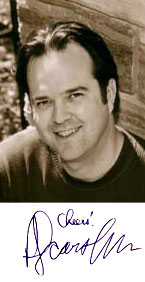
The traditional rhyme that begins, "Tinker, tailor, soldier, sailor...," could almost apply to Toronto's Richard Scarsbrook, except that it would need to be reworded, "Author, actor, teacher, poet, musician...," but not necessarily in that order.
Born in Leamington, ON, on December 20th, 1968, Richard grew up close to that community. "I went to elementary school in Ruthven, which is about halfway between Kingsville and Leamington, and then I went to Kingsville District High School. The Kingsville/ Leamington area is as far south as you can go and still be in Canada. It's actually on the same parallel of latitude as North Carolina, and other than the West Coast, it's the warmest part of Canada."
"For a long time when I was very young, I wanted to be an astronaut, but I was disappointed when I found out you couldn't be one if you had bad eyesight. As a youngster, I also thought I might want to be some kind of scientist. Most people when they hit a certain age in their lives start discovering their talents, and I discovered that I liked acting, I liked public speaking, and I liked writing. I found words came fairly easy to me. All of those things sort of rolled into teaching. As a teacher, you do have to be able to act to a certain extent, such as when kids who are supposed to be in your control do something you think is hilarious, but you have to act as if they shouldn't have done it and you're really angry."
"I didn't do a lot of writing in school, but there were two things I did that started around grade five. I wrote cartoons, and, for grade five/six kids, they were fairly funny. I had a friend who did cartoons, and we shared characters back and forth. The plots were basically consisted of fun character A meeting dumb/annoying Character B and Character B getting crushed by a rock. I guess that's where some of the more low-brow humour in my writing comes from. I also wrote a lot of science fiction, mostly because Star Wars had just come out. With the special effects we have now, it's easy to forget what a cinematic masterpiece Star Wars was at the time. It blew my mind! If you were 10 to 12-years-old and had been seeing claymation and cartoon science fiction up to that point, all of a sudden, there was something on the big screen that from beginning to end looked totally real. I wrote stacks and stacks of science fiction stories, and I had a couple of teachers who would actually patiently read these things, make the minor changes that needed to be made, and say, "Oh, I liked it when this happened.' As you grow older, you realize that sometimes such comments aren't always sincere, but at least they read some of what I was writing outside of school and didn't go, 'Yah, whatever,' and toss it. That bit of attention probably helped."
"In high school, we had a couple of teachers who taught 'great' literature and knew it inside and out. By the time you were 10 pages into a book, you were just so excited about it. To a budding writer, that's so important. To have the fortitude to bring any piece of literature to its finished point, whether it's a humorous book for teenagers or serious adult literary fiction, you have to be excited about it. You have to have that enthusiasm to carry it all the way through to the end, and having a couple of teachers who were really into English literature, as opposed to a gym teacher that got stuck with one English class, made those of us that had the inclination really excited about reading it and consequently writing it. English curriculums have improved since I was a kid, and they've introduced a lot more creative writing programs where students learn different styles of writing throughout the term. If there had actually been a creative writing course back then, and I'd just been given a little extra push by someone saying, 'You're good at this kid, and you better start being serious about it in high school,' my writing career probably would have started a lot sooner."
Following high school, Richard attended the University of Western Ontario in London where he completed a BA (Hons.) in History in 1991. The next year, Richard spent as a teaching assistant at Riverview Public School in Port Lambton, ON. "I wound up teaching part of the class full time. A great experience, it made my year at teachers' college at the University of Ottawa somewhat of a cakewalk. When I graduated from Ottawa in 1993, teaching jobs were hard to come by, but I was lucky. Initially, I supply taught, but a principal at Queen Elizabeth II School in Petrolia, a nice small town in southern Ontario, thought I was doing a good job and hired me on. I stayed there for about a decade and taught grades seven and eight, just like I'm doing now. Even though I'm not that old, I've become a 'veteran' grade seven-eight teacher."
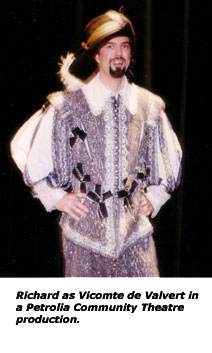
Richard found living in a smaller community offered him some real opportunities. "If you have any aspirations to play music or act, you can become a big fish in a small bowl pretty fast in a small town, and it was a town with a lot of talented people to play and act with. I play the drums, and I hooked up with some local musicians and started up a rock band called 'The Know.' I was also really involved in the Petrolia Community Theatre, and I acted in one or two plays a year. It was also when I was living in Petrolia that I started writing seriously."
Richard's presently teaching at Toronto's Crestwood Preparatory College, a coed university preparatory school of some 400 students in grades 7 to 12. "What is funny is that I have a history degree, yet, after a decade of teaching, Crestwood is the first school at which I've actually taught history. I love working there - the staff and administration are excellent, and the students are fun to work with."
With his interests in music, drama, writing, plus his job as a teacher, Richard, recently married, has discovered that "keeping all the balls in the air is hard. Sometimes you have to let one thing go in order to succeed at another. Before we were married, my wife said, 'You're good at all of these things, but, as we move on together and if we have kids, you're not going to have time to do them all. Which one do you think is your best thing outside of school? Maybe you should just pick one or two, and not try to do everything.'"
"And I replied, 'Well, I think maybe my best thing is writing, and so I'll concentrate on that. And maybe music is my second best thing, so I'll still have a band, but mostly just for fun.' That's pretty much what's happened, and I haven't done any acting or theatre other than directing a play at Crestwood a couple of seasons ago. My present band, 'The Nerve,' rehearses in my house. The guys I play with are all really good. We could probably go out and play more shows than we do, but all the other guys have a thousand other things going on, too. David, our rhythm guitarist, is a partner in a public relations firm, Barry, our bass player, has his own computer business, and Alex, our super-talented lead guitarist, is a teacher, too. The guys are all quite versatile. We've all been playing long enough that we have a lot of different musical influences. We do rock and roll, some blues, old country, and fun 60's and 70's stuff. We're fortunate that three of the four guys can sing, and so we do a lot of songs with vocal harmonies, like the Beatles - although we make a lot less money at it than the Beatles did!"
Although Richard's short fiction began being published in1996, he observes, "I'm not certain if you really get taken very seriously until you have something printed in a cover by a real publisher. Anything else, as far as the average person is concerned, you're still functioning on an amateur level. I've had a fair amount of short fiction and poetry published, and I've picked up a few prizes, but it takes time to get things going. When I talk to people who are just starting out in writing, I say, 'Think of it like rolling a snowball uphill for a long time in dry snow. You're going to be pushing for a long time before anything starts to stick.'"
"I also advise new writers to employ a wide shotgun effect. Start with magazines because no publishers will look at you if you haven't got some kind of track record. But don't fire one bullet at one magazine. Scatter as much shot at everybody as you can. If you write one story, research all the markets and send it to everyone that might be remotely interested in it. I know they say, 'No multiple submissions,' but they're probably all going to reject you the first time around anyway. Probably most of them won't even read it because they don't know who you are, but the thing is, you got your name in their head once. Then keep doing it. Write more and more and more stuff. Get a big spreadsheet and keep track of it all. As soon as you send out one volley and they all get rejected, take the same story and send it to the next six. Believe in yourself, and laugh in the face of rejection."
"NeWest Review was the first to publish one of my stories. They were a good little magazine when they were around. The letter I got from them was funny. It said, 'Our mandate is to publish western writers only, but I liked this so much that I want to publish it any way.' That was the first little bit of 'snow' that stuck to the snowball. Then, after getting one thing published, you can say in your cover letter, 'I just published a story last month. Maybe you'd like to take a look at this new piece.' Again, most of your shots are going to miss because, when you start out, no one knows who you are, but then another magazine will pick up something and another will pick up something else. Once you have three or four things published, then the editors start taking you a little more seriously. When you're a writer starting out, the biggest thing is perseverence. You just have to push and push and push, but the more the snowball grows, the more momentum it has."
Richard's first book is Cheeseburger Subversive, a collection of 12 stories which follow Dak Sifter from grade seven into first year university. One of the continuing themes over the years is Dak's shifting relationship with Zoe Perry. "Some of the chapters I wrote just for the book, and some of them spring from short stories I wrote earlier that had been published. I noticed that a lot of my stories had characters of a certain age, and that I kept going back to certain themes that seemed to really hook at me. I thought these themes probably would hook at a lot of other people too. I saw three or four themes in the story that could be intertwined to make into a bigger story."
"When I started out, Cheeseburger Subversive was about twice as long as the finished book. In the original version, I actually followed Dak all the way to adulthood, into his late 20's. I sent this long book out to a bunch of publishers, and one of the chief editors of a major publisher got back to me, saying, 'This is great, but it should probably be broken into two books.' They sent it to their young adult editor who liked it as a young adult book, but she also found that it had an adult appeal in that adults could read it and say,'Yah, I recognize going through all these stages.' As it turned out, their marketing department couldn't figure out which niche they wanted to put it in: did they want to see it as a young adult book, or did they wanted to sell it as adult nostalgia? So, in the end, they passed on it."
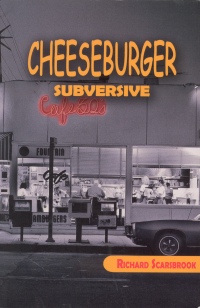
"My response was, 'Well, I guess I'll fire it out again. This time, I'll just send query letters, and I'll say I've changed this book into a young adult book.' Just as I was about to do that, Thistledown Press contacted me, and they had exactly the same idea for the book. They said, 'Why don't we cut off the last third, and we'll sell it as a young adult book?'"
"Because the novel is a collection of interconnected short stories, I wondered if it would be successful or not, but the best test is always the people who pick it up at a bookstore and read it. I've gone on some websites where kids post reviews. One of them wrote:
This made me feel great because this young reviewer's observations are exactly what I was shooting for. We don't suddenly become complete people between grade seven and the first year of university. We humans are formed gradually by certain critical events and how we react to them, and I think the book focuses in on these critical events. As well, there's kind of a dividing line in the book regarding Dak's relationship with his parents. When Dak gets old enough to drive, his parents almost completely vanish from the book, and, in many ways, that's what happens in real life. Once you get that independence, your peers and similar aged nemeses have much more of an influence over you than do your parents. I guess I could have rewritten the book a lot more and could have made it all happen over the span of a year, but I actually think it's more believable the way it is."
"R.P.(Rod) MacIntyre, the editor who worked with me on Cheeseburger Subversive pretty much liked the chapters as they were. In fact, he said that the only chapter that he put any real question mark on was 'Renaissance Man.' All excited about getting my book published, I said, 'We can just cut that chapter if you want.' He replied, 'No, no, no. It's this close to being a great chapter, but there's something about this story that doesn't quite fit.' I responded, 'Well, that may be because I pushed some fictional elements into what started out as an essay.' And he said, 'Ah, I think I can tell which parts came from the essay,' and he made one simple suggestion: 'Dak's sister, Charlotte, appears at the beginning of the chapter. Why doesn't she appear at the end?' It's great how editors can sometimes give you these little nuggets of gold."
"Originally, 'Renaissance Man' was a long series of art jokes, but Rod said, 'Why don't you just keep the jokes that everyone will get and focus more on the tension between Dak and his sister?' His gentle input really made it a much better chapter. Rod was a good editor in another way, too. He would suggest something, 'You should change this...,' and I would email him right back and say, 'No, I don't want to change it, and here's why,' and he'd go, 'Fair enough.' He would just make sure why I was doing something a certain way and that I'd thought it out. In 'Thank You, Quentin Alvinstock,' I included Dak's poems, and they're the sort of bad poems that beginning poets first write. The first ones were like rock and roll lyrics, but, by the end, they're actually starting to look like actual poems. Rod had this aversion to including them and suggested, 'You should just talk about the effects the poems have.' He said that readers would think, 'This is Richard Scarsbrook's poetry, and it's junk.' His point was valid, of course, but I stuck to my guns, believing that readers would see the poems as Dak's, and not as mine. Rod was great because he said, 'Ok, I still don't agree, but we'll leave it alone if that's what you want to do.' Some editors can be a lot more stubborn about things like that."
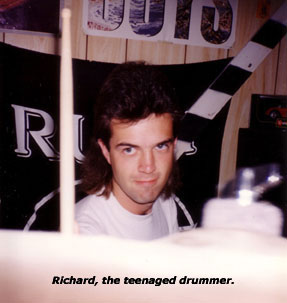
Because Cheeseburger Subversive is about a boy growing up, a natural question is the degree to which its contents are autobiographical. Richard replies, "I'm paraphrasing Margaret Atwood and probably a dozen other authors when I say that I think that giving away what actually happened and what you made up is like a magician showing the audience how the rabbit's hidden in the hat. The magic of fiction is that what's real and what's made up really doesn't matter. It's interesting when people come up to me and say of the novel, 'It was funny when that happened to you,' and I have to explain that, 'No, Dak's a created character. He's not me.' But, having said that, people who know me can tell that there are certain similarities between Dak and me as a teen, although in certain cases I didn't react to things as intelligently as Dak did, and I probably wasn't as mild-mannered as Dak."
"There are a few episodes in the book that had their beginnings in real life. 'Hell on Wheels' has its roots in my own childhood. When I was in grade seven, a guy came on TV and said, 'The world is going to end at a certain time today when the planets line up in a certain way.' A lot of kids at school were really upset, and some were afraid and crying. I had fairly rational, reasonable parents, and my dad said, 'The planets have lined up like this hundreds of times before, and nothing ever happened. Go your encyclopedias, and look up how many times this has happened in the past hundred thousand years.' I did and found out that what he said was true, and so I wasn't afraid any more. That was the first time in my life I was unafraid of something that everyone else was afraid of, and that was a big turning point for me, and it is for Dak, too. It's the first time he realizes that, by being unafraid, he's given himself power."
"Another connection with my real life is in 'Pushin' Pickle' because, while in university, I actually did 'push pickle' at the Heinz factory in Leamington. How I described the job in the story is dead on. That was a deadly job. The reason that none of the union guys would do it is that, at the end of the shift, your hands were paralyzed. It hurt you everywhere - in the base of your thumbs, in your elbows, and in muscles you never thought you had. I thought it would be funny to put Dak, this meek kid, who's really too young to be there, in that situation. Bookish, Dak's never really worked too hard, and I have him experience something that brings him out of his shell. Earlier in the book, I had also started this thing between Dak and his father, and I wanted to have a serious turning point which sees Dak sticking up for his father who, as it turns out, is also willing to stick up for his son when it matters."
"Cheseeseburger Subversive's intentionally full of archetypal characters that almost everybody runs into over the course of their school years. On the surface, it's a funny book about growing up male at a certain point in time, but there's a lot of stuff that I hope readers will find under the surface if they feel like it. For instance, there's that hierarchy of evil that kids face. At the top of the hierarchy are the really dangerous bullies, like Devin Orff; then there's Cliff Boswink, who represents the sort of sticks-and-stone bullies, and, at the bottom, the little toadies who are nothing without their bully leaders and the other toadies. Dak encounters all of those types, the toady types, the sticks-and-stone bully who will break down when you corner him, and then the ones that really are dangerous, the ones you need outside help to deal with. The book also has certain teacher archetypes which most students will recognize. Dak's dad is the 'old school' strict disciplinarian who teaches 'English literature only' and nothing published before 1940 except Robertson Davies. Then I contrast him with a left-leaning liberal type teacher in 'Thank You, Quentin Alivinstock.'"
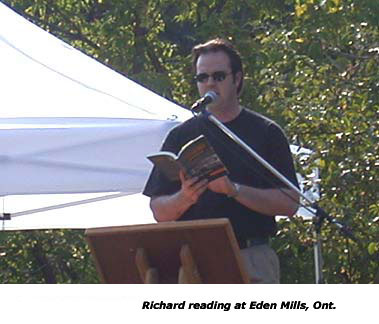
"I really am sort of a bipolar writer. One side likes to write to entertain and be funny, only hiding the little nuggets of truth about life beneath the fun. The other side likes to hit the reader really hard with the nuggets of truth. Actually, they're boulders, not nuggets. The first style of writing, with the nuggets underneath the fun story, predominates in Cheeseburger, with the exception of 'Benjamin's Aliens.' That one hits you square between the eyes. Another way of putting it is that sometimes I write so the story rolls along over top of what I want readers to go away thinking about, and then there's my other style, where nothing is rolling over top, and the boulders are the story."
With all of Richard's interests plus a full-time job, finding time for writing can be a challenge. "Being a teacher affords me the opportunity to write in the summer time, but you have to be ultra-disciplined because there's nice weather outside and all these fun activities going on. My wife's a lawyer, and she tends to go to work later in the morning than I do, and some nights she gets home much later than me. The hardest thing for a writer to do is to pull away from friends and family to get the job done, but in my current family setup, there's actually a space of time when I'm not teaching and I'm not spending with my wife that I can use to write, and I take advantage of it."
"I probably wouldn't be an ideal writing instructor because I don't do things the way I've read a lot of other people do. Most things I've read about writing tend to say, 'Write every day, no matter whether it's good or not. Sit down and be disciplined and write, write, write!.' I don't do that at all. Usually I just think about several stories at a time, and I have them in the back of my head, coming together in my subconscious. There's usually some main idea I want the story to stick to, and then, as time goes on, I think of or experience things that stick to the main idea. If they're good enough, they stay stuck. Symbols, plot developments, character quirks, dialogue, nice-sounding word combinations - all of these things collect up and stick to a main idea I have."
"I don't really sit down to write a story until I've pretty much got it all pieced together, and then I sit down and purge it all, I write and I write and I write. I write until my shoulders and fingers are sore and my eyes are bleary. After all of that time inside my head, what winds up as the finished product has had time to sort itself out, and often doesn't look too bad. That process of getting it all out in one go can be crazy sometimes. I might come home from teaching and work on a story until the sun comes up again in the morning. I wring it into shape as it goes. Again, there many writers who get the bare bones down and then they go in and fill in the details later, but, for some reason, it's really important for me to bend all the details into shape as I go. Consequently, I work long and hard once I get started, and there's a lot of forward momentum."
"After it's all down, I put it away for a while and don't think about it all because I like to come back to it as a 'different' person. When I was writing it, I loved it, but I wait until I'm not that in love with it anymore before returning to it. When I come back to it, I read it as if I'm the story's worst critic. In doing the initial writing, I write almost in a stream of consciousness way, but the editing is exactly the opposite. I do that very methodically. I'll go through once with my cleaver and cut out all the fat. 'Does this word need to be here to make any difference? Does what I'm describing here matter to the big picture?' The first thing is the big picture because you want people to leave readers with a certain taste in their mouth, something to think about later. A lot of people get caught up in their own pretty words, but, if the pretty words don't contribute to the end effect, they don't really matter. I make myself hate my pretty words. If these pretty words don't contribute to the end effect I want, they're gone! I think I've become good at hacking a wordy 6,000 word piece down to a sharp 4,000 word piece."
"Then it's more detail work at that point. I'll go through and check for consistencies in the characters, and I'll make sure the metaphors and the symbols are original and not too forced, and that the words have a nice feel to them. It's the old editing process that everyone has to go through and most creative writers hate doing. I've actually developed a perverse love for that first 'slash and burn' edit. After that, it's a couple of skim edits and then out it goes."
"I really enjoy coming up with titles. I was giving a workshop at a writer's camp in Toronto last summer, Camp Writeaway, and there were some really talented young writers there. One of the girls had read Cheeseburger Subversive, and she said, 'The title of your book and its chapters are really catchy. Do you have rules for picking titles? My story titles are always things like "The Bad Thing That Happened"' Until somebody bothered to ask me, I hadn't actually thought about how I come up with my titles. "Cheeseburger Subversive" refers to the critical turning point in a later chapter in the book. In the earlier chapters, Dak has been only partially taking charge, or fate has been helping him along, but in that chapter he stands up and turns a situation around because of his own motivation. Nothing outside him makes him do what he does; it's not fate that pushes him. So the title refers to a critical turning point in the story, where he does something subversive in a cheeseburger joint. But, if you think about it, the title also describes Dak as a character. A cheeseburger is something nice but average. Everyone likes cheeseburgers, but, like Dak, they're not too exotic or exciting. In order to impress Zoe, Dak eventually decides that he's got to push himself to a state of subversion in order to seem appealing enough to her, so the title describes his character conflict - a 'cheeseburger' trying to be a 'subversive.'"
"As well, 'cheeseburger' and 'subversive' are two great sounding words. I like to have two or three words in the title that sound good together, and 'Cheeseburger Subversive' has got a nice rhythm to it. So, first, the words have to sound nice together, and then there has to be some kind of important connection to the story, be it to the character or to the meaning of the story. Another title I really liked was 'Thank You, Quentin Alvinstock.' That chapter's where Dak pushes his way back into Zoe's consciousness. The title's words sound good together, and I created the name 'Quentin Alvinstock' because it just sounded like a good name for a poetry-loving ex-hippie teacher. The concrete connection to the story in the chapter is that Dak wants to thank his teacher for turning him on to poetry writing, which indirectly gives him a shot at winning back the girl of his dreams. Again, it obeys my rules for titles that I hadn't even thought about until a clever student asked me - words that sound good together, and one or more connections to the characters or main events in the chapter or story."
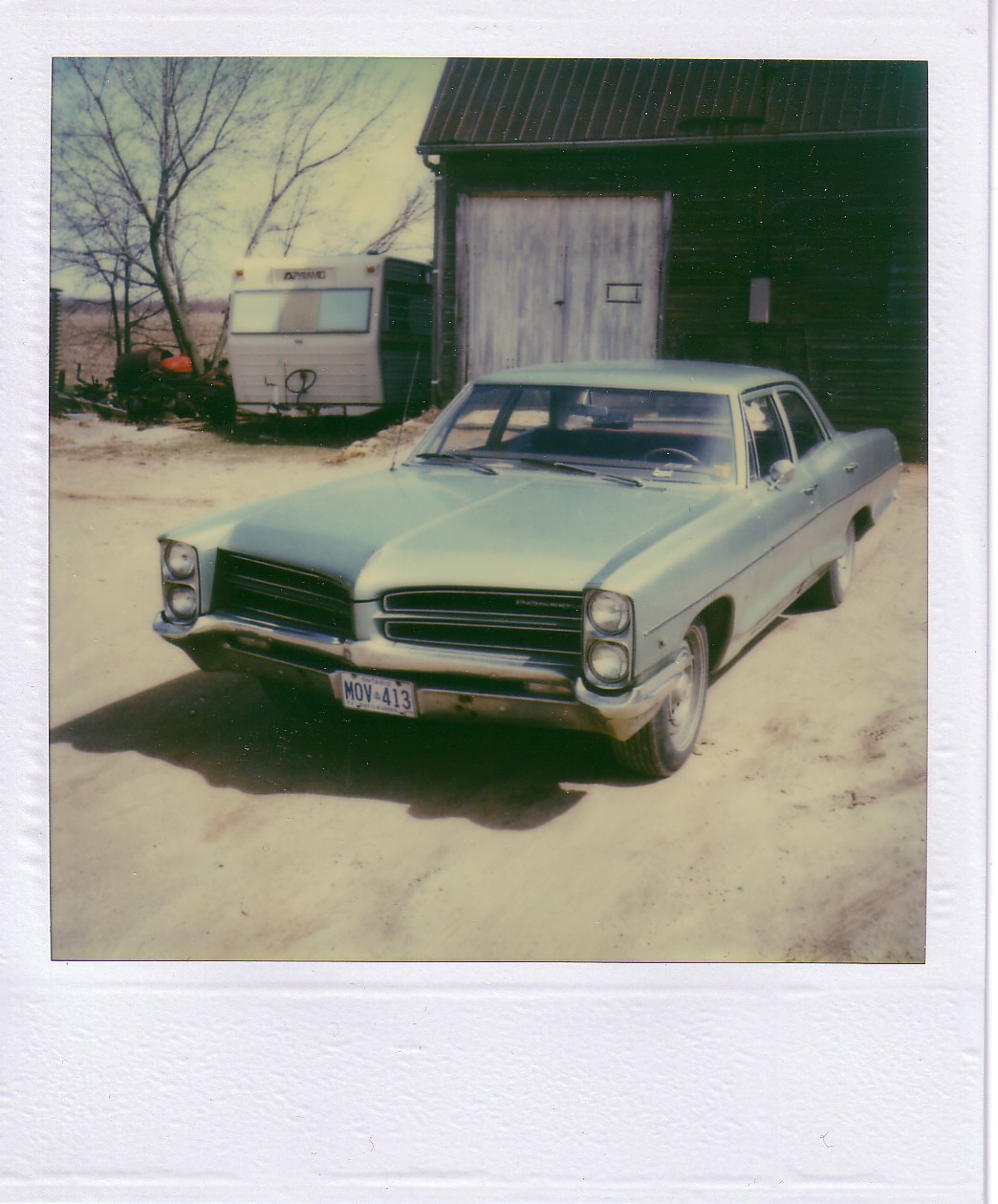
An unusual, but fun, feature of Cheeseburger Subversive is its inclusion of unusual little "postscripts" to some stories. For example, "Lawn Boy' concludes with a "For Sale" notice for the Sifter's lawn tractor while "Hell on Wheels" ends with the "official" Fairville Board of Education document suspending Cliff Boswink. "Initially, I had more of these, including a few photos. At the end of 'Cruisin' Machine,' I had a picture of a 1966 Pontiac. I really did have a '66 Pontiac which I totally loved. Guys used to laugh at this big ugly 'boat' until I raced them on a back road and blew their butts off. In 'Renaissance Man,' I originally included a picture of Botticelli's famous La Primavera with all these women who are very bulbous and pear-shaped. I wanted the picture for those people who didn't know Botticelli so that it would really emphasize the little joke Dak makes about Hilda, the art gallery's curator."
"My next book is written. More of an adult book, it has a couple of tentative titles. 'Destiny's Telescope' is one, and 'The Doppler Effect' is another. If and when a publisher is interested in the book, the title will be a coin toss they can make. The overarching question that this collection of stories asks is: how much or how little control do people have over their own fate? I think that this theme pulses beneath the surface of Cheeseburger Subversive , too, but in the new book these themes will be a lot closer to the surface. This book will be more of that second style of writing I mentioned earlier."
"My next task is to write 'Featherless Bipeds,' a sequel to Cheeseburger Subversive. The title refers to an incident when Socrates was teaching his class in the School of Athens about classification. Trying to get across the concept of classifying by a general then a specific term, Socrates asked his students, 'How would you classify a human being?' One of his students replied, 'A featherless biped, because we have no feathers and we walk on two feet.' Socrates walked out without saying another word, and his class sat there mystified. A half hour later, Socrates walked back in with a dead plucked chicken and dropped it on the floor, saying, 'Now, try again.' That story's kind of analogous to a couple of things that will happen in the book."
"Dak is going to drop out of school and start a rock band. This book's going to be 'Dak Sifter, the Rock and Roll Years,' and Zoe will be involved as will at least one other peripheral character from the first book, plus some interesting new characters. There's going to be, hopefully, a funny chapter where all they do is fight about what they're going to name the band, and Dak comes up with Socrates story. As in Cheeseburger Subversive, the title refers to several different things on different levels. It's the name of the band, but also it describes Dak's situation in the book, where there's going to be a whole bunch of occasions where Dak sees something happening one way that's actually something different, like that student saw from Socrates that day at the School of Athens."
"I can promise readers of Cheeseburger Subversive that they will find out what happens with Dak and Zoe, and their relationship will become even more complicated than in Cheeseburger Subversive. The first chapter will tell you what happened when Dak went running after Zoe at the conclusion of 'Tristan's Quarter.' That chapter's actually written which means that anyone who cared about this book will be bugging me, 'What happens?' But it won't be predictable. It's not going to unfold the way you think it will."
Books by Richard Scarsbrook.
This article is based on an interview conducted in Toronto on September 2, 2003.
